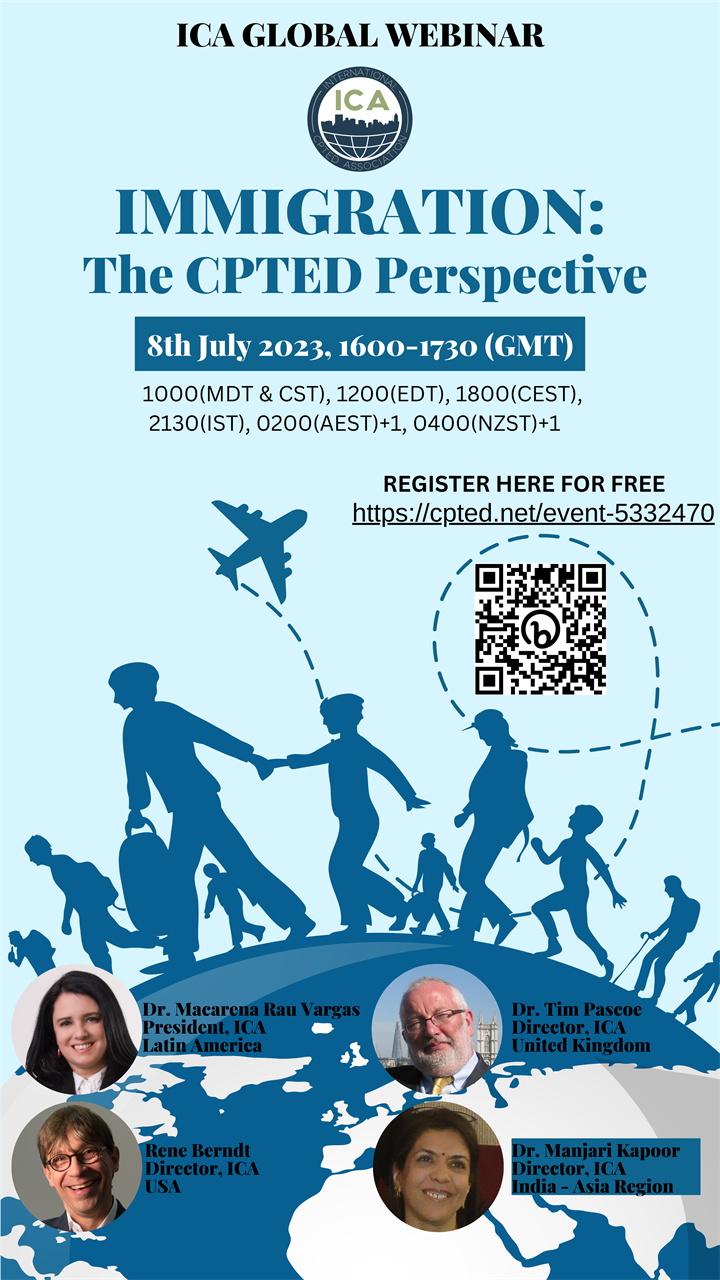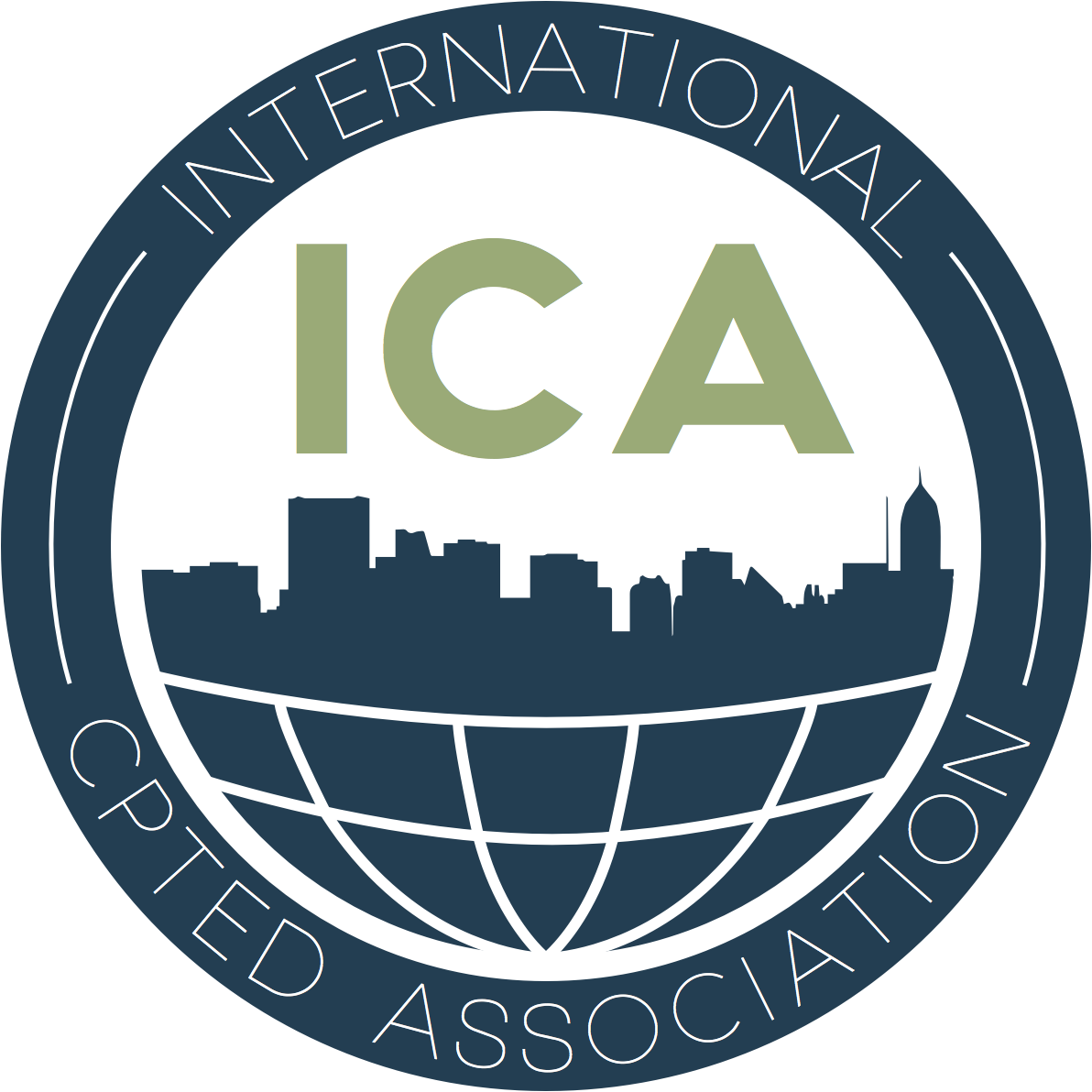Disclaimer: “The views expressed in this webinar belong to our guest speakers and do not necessarily reflect the position of the ICA.”

FREE!
Register here: https://bit.ly/436qNyj
ICA WEBINAR:
IMMIGRATION -
THE CPTED PERSPECTIVE
Saturday, 8 July 2023
16:00 GMT
09:00 PDT (e.g. Portland)
10:00 MDT (e.g. Calgary)
10:00 CST (e.g. Mexico City)
12:00 EDT (e.g. New York)
18:00 CEST (e.g. Amsterdam)
18:00 SAST (e.g. Cape Town)
21:30 IST (e.g. New Delhi)
00:00 HKT (+1) (e.g. Hong Kong)
02:00 AEST (+1) (e.g. Sydney)
04:00 (+1) NZST (e.g. Auckland)
Immigration is a constant phenomenon, for evolving and changing reasons, like climate, threats, livelihood, survival and many more. This has been happening throughout history and is likely to continue despite all the check and controls there may be. There are positives and negatives that are attributed to this movement of humans depending upon the perspective it is being viewed from.
Immigrations and immigrants in particular are traditionally stigmatized for crime rates in their host countries. Immigration very often is considered synonymous with crime. Can we prevent crime by preventing immigration? Is the onus of crime prevention on the immigrants? What is the real relationship from the CPTED viewpoint?
The International CPTED Association brings you a discussion on this very vital aspect of global life today, in a systematically curated panel discussion with experts dealing with diverse aspects of this phenomenon. It will include discussions from multiple dimensions including the ones added by the online participants.
Being a global event, with relevance to all regions, we understand that the time slot may not be convenient for all. Hence we strongly recommend that you register to be able to receive the recording and also share any specific queries you have. Even if you are not connected to ask the question, we will try to include your question in the broadcast for the benefit of all.
Topics will include:
- The role of CPTED in the phenomenon called immigration
- The role of CPTED in crime prevention attributed to immigrants
- The role of CPTED in making the immigrants secure and making them feel secure
- The role of the 3 generations of CPTED in the immigration phenomenon
- The impact on children and related experiments on the same
***
We call for your inputs and views on the above and encourage you to mention if you have something to share on the topic. You may share your thoughts in the queries/discussion section during registration. Alternatively, you can also email questions/points to us or post them in the comment box during the live webinar session.
We may decide to include any exceptional thoughts, cases or examples and invite the authors into the webinars. This is in an effort to make webinars more interactive and inclusive.
Though our panelists are comfortable in different languages, the webinar will be presented in English.
Please share this with anyone who you think might benefit from learning more on this topic.
We look forward to connecting with you!
Who should attend: Architects, urban planners, designers, CPTED professionals, safety and crime prevention specialists, public officials, safety consultants, police officers, academics, students, researchers, policy makers, urban development experts, criminologists, sociologists, social engineers, decision-makers, and others.
***
Panelists:
DR MACARENA RAU VARGAS
President ICA, Chile
Macarena Rau Vargas has a background in architecture, a Master's Degree in Research and Philosophy of Architecture in Chile. She has completed her PhD in architecture and urbanism studies. She has a wide experience leading urban and public safety projects and initiatives in Chile, Latin America and the Caribbean.
In 2008 Macarena founded PBK Consulting; a company that assists governments, companies and NGO’s applying CPTED strategies in countries like Mexico, Honduras, Chile, Brazil among other. In this role she has particularly promoted the 2nd Generation CPTED.
Mail: president@cpted.net
DR. TIM PASCOE
Director ICA, United Kingdom
Dr. Tim Pascoe has been a Community Safety Researcher for over 25 years carrying out qualitative and quantitative research and evaluation. He has a particular interest in Designing and Managing Out Crime. His work has resulted in a publication record that has added to the understanding of community safety problems and solutions.
Mail: tim.pascoe@cpted.net
RENE BERNDT
Director ICA, USA
Rene Berndt, AIA LEED AP, Associate Principal at Mahlum Architects, has 25 years of architectural experience and extensive knowledge of learning environments tailored to the specific social-emotional needs of each age group. In the last decade he has become concerned that strategies with the goal of providing safety in schools have instead increased anxiety, fear and conditions that could foster bullying, vandalism and social isolation. To counter this trend, Rene is promoting the CPTED Defensible Space tenets and aims to provide learning environments that foster positive social relationships.
Mail: rene.berndt@cpted.net
DR. MANJARI KHANNA KAPOOR - Moderator & Panelist
Director ICA, India
Dr. Manjari is a practising architect and academician at the leading architectural schools of Delhi NCR. She is the first in South Asian region to pioneer ‘security through architectural design’, propagating the concepts of CPTED and counter terrorism through design.
For this objective she is the Founder President of ‘Association for Building Security- India’ a chapter of the ICA and a Director on the board of the International CPTED Association (ICA). She is also the author and Chairperson of the SEQURE standards for design of buildings and rating systems.
Mail: manjari.kapoor@cpted.net
